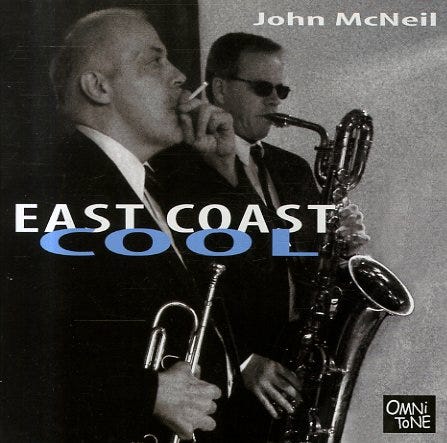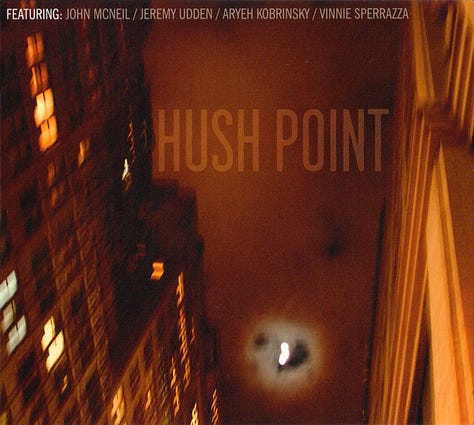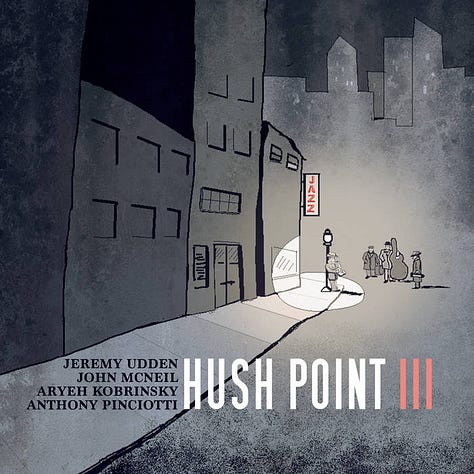In the early 2010s, trumpeter/composer John McNeil, aided and abetted by trombonist/composer Mike Fahie, ran the hippest jam session in Brooklyn, at the Tea Lounge in Park Slope. At night’s end, the house bass and drum team returned, the horns lined up for one-chorus solos, and McNeil would stomp off Dizzy Gillespie’s “Ow”, the Tea Lounge jam’s unofficial theme song.
So when Caleb Curtis played “Ow” in the green room at Ravenscroft in Scottsdale, AZ two Fridays ago, Noah Garabedian and I knew. John McNeil had died, a sad loss of a looming light in our community. I first met Caleb Curtis at John’s session; our band Ember comes out of the scene John McNeil created. “Ow” indeed.
Michael J. West’s nice piece in Downbeat gives an overview of John’s life, while Ethan Iverson’s brief remembrance highlights two salient facts about McNeil: he was an active participant in the music from the mid-Seventies on (his first session as a leader, Embarkation (Steeplechase, 1978), is a tasty slice of tough Seventies jazz with a great Billy Hart performance) and he made it his life’s work to pass on his knowledge. Afflicted with CMT (Charcot-Marie-Tooth) disease, John met his life-long health challenges head-on, tirelessly supported by his beloved wife, trombonist Lolly Bienenfeld.
Wherever you encountered him— at home in Park Slope, at his gigs at Night and Day, Puppets, or Cornelia Street Cafe, or checking in on his many students at one of their gigs, John was ready to talk music, share some wisdom and perspective, make you laugh, and speak the truth.
As my friend drummer Jay Sawyer said to me the day after his passing, “John McNeil would always tell you what you needed to hear, not what you wanted to hear”, which summarizes my community’s relationship with John. He fought for every note he played, spoke the truth, and paid it forward.



Some of John’s best work is frustratingly out of sight. Omnitone, a great label focussed on a certain progressive NYC sound, hosted some of John’s best sessions, but none of them are streaming on the major sites. Lolly Bienenfeld graciously shared some of her favorite Omnitone-era John tracks with us, and they included “Mi Tio” from This Way Out (2002) recorded in Barcelona with tenor saxophonist Gorka Benitez, Giulia Valle on bass, and drummer Joe Smith, an exciting, folk-tinged quasi-calypso, while Sleep Won’t Come (2004), recorded in Denver with a trio of John, pianist Jeff Jenkins and bassist Kent McLagan, contains an astonishingly pure and heartbreaking version of “The Water Is Wide”. This is the John that could melt you.
East Coast Cool (recorded 2004, released in 2006) features a great Matt Wilson performance, with John Hebert on bass and saxophonist Allan Chase, on bari for this date, sharing the front line with John, for their skewered but affectionate take on the Gerry Mulligan-Chet Baker sound. The historical frame and humorous photos are just the surface; underneath it all was McNeil’s pure lyricism and infectious feel. Maybe if we make enough noise, John’s Omnitone catalog will make it to Bandcamp.


Around the time East Coast Cool was released, John began a weekly Sunday night gig at a barbecue restaurant in Park Slope first called Night and Day, later called Biscuit. I remember seeing him with saxophonist Bill McHenry, with whom he shared a wonderful rapport. They were a natural pair and are thankfully documented on two delightful Sunnyside releases, both with the great bass/drum team of Joe Martin and Jochen Rueckert— Rediscovery (2007) and Chill Morn He Climb Jenny (recorded at Cornelia Street Cafe in 2009), the title of which encapsulates John’s irrepressible humor. Nate Chinen, then at the New York Times, used McNeil’s regular gig as the centerpiece for his 2006 story on the Brooklyn jazz renaissance.



John McNeil’s final project, a group founded on both his stature and history in the jazz community and the power of his vision, was Hush Point. He first assembled us— alto saxophonist Jeremy Udden, bassist Aryeh Kobrinsky, and myself— in 2012, and by 2013 we were gigging around town, had done a few road trips, and had a record out, Hush Point, also on Sunnyside.
Though I was only in the band for two years, I learned as much from John as anyone ever has. It was a strictly all-brushes band, a real challenge for me— John scowled when I picked up some timpani mallets, and was only provisionally okay with bare hands. This was John’s idea, the foundation of the band’s sound, a low dynamic level that allowed for a new kind of interplay and intimacy.
He started by teaching us (by ear) some heads over standard forms— “Get Happy”, “Long Ago and Far Away”, “Too Marvelous For Words”. Every choice was examined— John meticulously experimented with register and harmony, often spending an entire rehearsal on just one tune. He helped me find things with brushes that I’d never played, spontaneously orchestrated the solos, cueing us to enter and drop out, and asked us to memorize the music.
John heard everything I played, and choices that seemed incidental to me were, to him, matters of great importance. At first I didn’t understand. Later, of course, I realized he was right. I heard what John heard, and saw us as John saw us: a splendid and cool small jazz group, playing without charts, pulling melodies out of thin air from our camaraderie and private dialogue.
With the wonderful Anthony Pinciotti on drums, the group went on to make Blues and Reds and Hush Point III, certainly the most complete expressions of John’s conception in his too-small discography. On “Wu-Wei”, McNeil and Pinciotti engage in some low-volume, high-intensity burn, while the loping, infectious “Wilbur”, with Kobrinsky’s bass tuned in 5ths, features John’s broad humor, bravery, lyricism, and mastery; a McNeil solo for the ages. These are great records by a great band.
I’m just back from Montreal with bassist/composer Michael Formanek; his trio of himself, me, and saxophonist Chet Doxas— the Michael Formanek Drone Trio— played our first gig in nearly two years at the L’Off Jazz Festival two nights ago, and this week we have a few shows in Brooklyn (at Lowlands on Tuesday Oct 8th, and the Artery on Thursday Oct 10th). I love this band, am honored to be a part of it, and our show at the L’Off Jazz Festival was a joyous reunion— thanks to the organizers and the attendees for such a great night.
But did I truly appreciate it? Not to overdo it, but do I really get how tenuous and brief our little existence is, and how music brings us together?
The passing of an elder drives the point home. John McNeil played the truth, no matter what, and gave of himself freely, for decades, so that the music and the people would go on. Let’s notice his great contribution, notice the great contributions of all those around us, and get together. Music really is, in the end, magic.
Thank you John, thank you all.





Thanks so much for this. I was lucky to be among the many many folks to benefit from McNeil's teaching—the lessons I took weren't many in number but were deeeeeeeep in content and have kept me busy ever since. (And yes, he even came to one of my gigs, even though I was a nobody who had only been studying with him for a brief time—his feedback: "you need to play with people who listen to you.")
Really beautiful, Vinnie, thank you. Completely agree that OmniTone would be an excellent addition to Bandcamp… is anyone in touch with Frank Tafuri these days? Also, regarding your dates with Formanek's Drome Trio, I'm pretty sure you mean Tuesday, Oct. 8 & Thursday, Oct. 10.